Digital Imaging QC
1/36
There's no tags or description
Looks like no tags are added yet.
Name | Mastery | Learn | Test | Matching | Spaced | Call with Kai |
|---|
No analytics yet
Send a link to your students to track their progress
37 Terms
advantages of digital over SF
reduced repeats from technical errors due to corrective software
filing: archived on computer system and no file room reducing lost images
postprocessing: resolution enhanced by computer software
teleradiology
reduced pt dose
disadvantages of digital over screen film
cost to initiate: equipment, hardware, software
lower spatial resolution: can resolve less lp/mm
collimation and centering need to be precise
more sensitive to scatter
dose creep: could increase pt dose
CR Erasure test
erasure thoroughness
expose IP with thick lead block
erase
make exposure with nothing and reprocess
verify absence of ghost image of lead block
plate uniformity testing is for
detectors and CR cassettes
plate uniformity testing
all calibrated to produce the same response to the same radiation exposure levels
expose multiple different detectors with the same kVp and mAs and should result in the same DI number
detector spatial resolution test
using LP test tool
the more lines you can see, the better SR
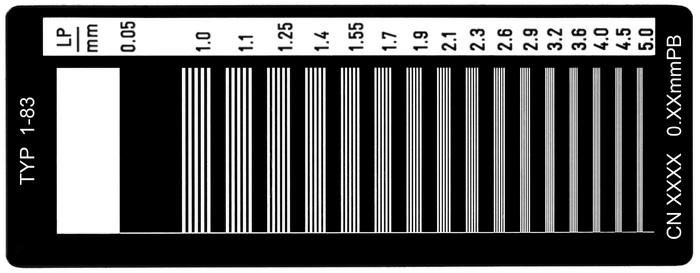
monitors need to be calibrated to
DICOM Grayscale standard display function
each equal monitor (all rads) must be displayed with same grayscale and brightness level
monitor evaluation is for
ensure consistent and accurate display of medical images: brightness, contrast, spatial resolution, distortion
2 patterns
SMPTE
TG 18
patterns for monitor evaluation
SMPTE
TG18
SMPTE
Society of Motion Picture and Television Engineers
display contrast
spatial resolution
distortion
luminescence: overall brightness
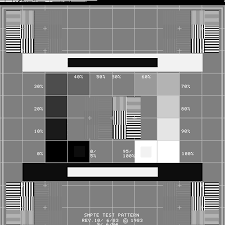
luminesence
overall brightness
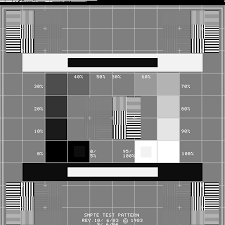
where do you find display contrast on SMPTE
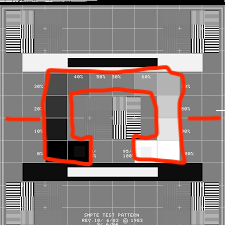
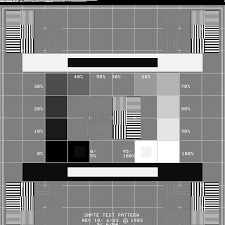
where to find spatial resolution on SMPTE
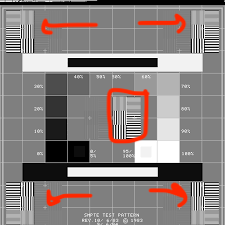
LP pattern is visible and straight, all letters and numbers are clear

where to find distortion on SMPTE
any area where the lines arent straight or visible
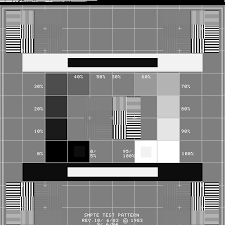
where to find luminescence on SMPTE
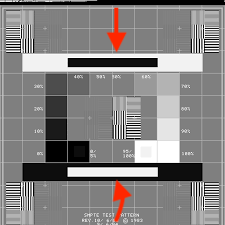
all squares are visible from adjacent squares
what do missing/dead pixels look like on monitor
appear as a white spot
areas of increased or decreased brightness
image blur
TG 18 test pattern
by AAPM (American Association of Physicists in Medicine)
geometric distortion
luminescence
resolution
no artifacts
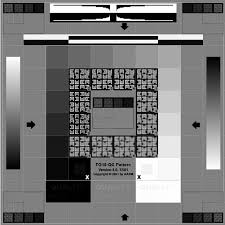
TG18 and geometric distortion
straight lines
borders visible
image centered on screen
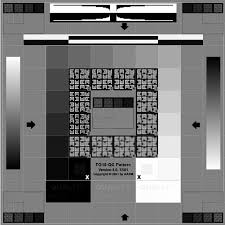
TG18 and contrast
5% and 95% squares visible
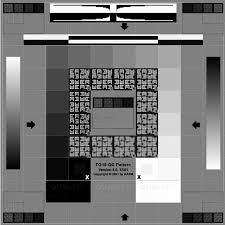
aspect ratio
ratio of width to height of display monitor
the software settings of computer controlling display
must be adjusted to match the aspect ratio or geometric distortion will occur
refresh rate
how many times each second that the monitor rewrites or updates the image on the display monitor
if too low can cause flickering
if refresh rate is too low
can cause flickering
printer QC
wet/dry laser imager
wet/dry laser imager how often
daily/weekly
wet/dry laser imager qc
look for artifacts
test temp of chemicals in wet
print test pattern to check density with densitometer
print test pattern for
wet/dry laser imager
technologist daily duties
inspect and clean PSP Cassettes or receptors and check hinges or latches
erase imaging plates
inspect laser printer
check interface and network connections
monthly QC Checks include
monitor tests: SMPTE/TG18
reject analysis
SMPTE should be done how often
weekly/monthly
reject analysis QC
QC tech, supervisor, RSO
data analyzed for reason, number of repeats, tech that repeated
when selecting reason for repeat why
must be accurate bc if it is due to over/underexposure the device may need to be recalibrated
semiannual QC is
vendor personnel preventative maintenance
PSP and FPD resolution test pattern
PSP and FPD resolution test pattern
contains lp/mm.
image it and compare with manufacturer recommendation to make sure it matches
DAP
dose area product
KAP
kerma area product
DAP and KAP for
measured by
measure of the total amount of radiation on a pt
measured by ionization chamber